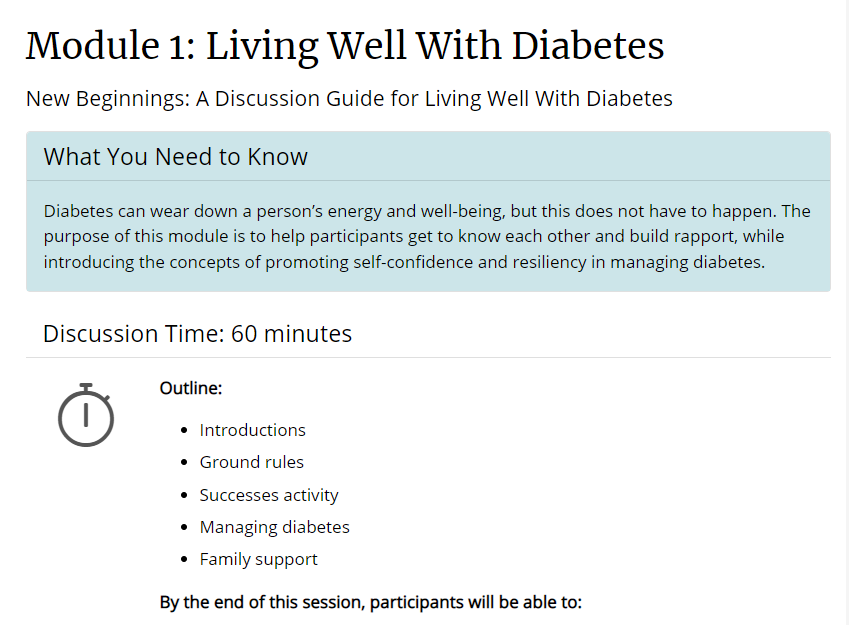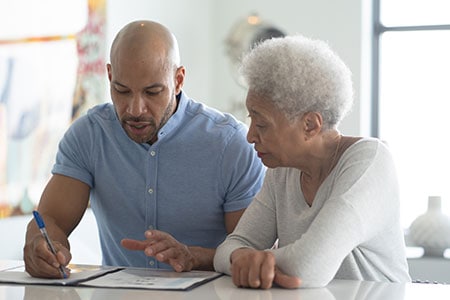Quick Tips for Using the Guide
New Beginnings: A Discussion Guide for Living Well With Diabetes

How to Begin
- Begin by reviewing the “What You Need to Know” section at the beginning of each module. This section will also provide the Going Virtual Tips for each module.
- Make activities and discussions longer or shorter according to the needs of your group.
- Turn the stories into role-plays by asking participants to act out the plot. You can also ask participants to use the content to make up their own stories.
- Each module has a list of videos, audio, or stories* that can be used during the session. Pick one or two according to the needs of the group. Running Times for each video or audio clip are provided.
Group discussion
Discussion questions are divided into two columns. Instructions for leaders are on the left. Suggestions for questions or key talking points are on the right.
Activities
Each module includes 1 to 3 activities to help participants apply what they have learned, practice new skills, and plan behavior changes. The activities can be adapted to meet the needs of your group.

Many modules include a “Think-Pair-Share” activity. This activity gives participants time to think about what they have learned, talk about it with one other participant, and then share key points with the rest of the group. The Think-Pair-Share activity is a good option when participants do not know each other well or are not comfortable speaking in front of a group.
At-home Activities are optional activities that provide participants an opportunity to think about what they have learned, practice at home, or discuss the topic with family members.
The Connecting Thread: Facilitating New Beginnings Online [PDF – 221 KB] has options for tailoring activities for virtual sessions.
All stories, handouts, and activities included in New Beginnings are in the public domain and may be used or copied without permission.
Adapting the discussion guide
New Beginnings is designed to be flexible and adaptable. It can be used with new or existing diabetes programs or support groups.
Although the focus of this guide is African Americans with diabetes, the topics discussed in New Beginnings are important for all people with diabetes and their families. If you are working with a diverse group, pick stories that will be meaningful to the people in your group.
You can also encourage the people in your groups to tell their own stories. Read Stories to Reach, Teach, and Heal for more information about using storytelling in diabetes education.
Building trust and maintaining privacy
The discussions in this guide ask participants to think and talk about their feelings about diabetes and the experiences they have had with the disease, both good and bad. This kind of sharing can make people feel uncomfortable. A New Beginnings discussion group should be a safe place where participants can express how they really feel and know that they will not be judged. They also need to know that what they share will not leave the group.
At the beginning of your first session (or as needed) ask the group to develop “ground rules” everyone can agree on.
Ground rules can cover:
- Sharing information. Everyone should have a chance to talk if they want. Group members should not judge or criticize other members. People should not give advice unless they are asked for it.
- Respect. Everyone has a right to their opinion or beliefs. People can agree to disagree without being disrespectful.
- Privacy. Participants should not talk about what is shared by other participants outside of the group. Participants should only contact participants outside of the meeting time if they have permission to do so.
- Other issues. Groups can also set rules about behaviors such as taking phone calls and texting during the session, bringing children, or bringing healthy snacks.
Write the ground rules on a piece of paper and post them at every session. Remind group members about the ground rules during each session or if there are problems.